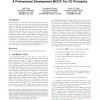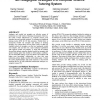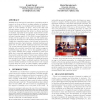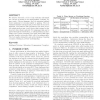SIGCSE
2016
ACM
8 years 7 months ago
2016
ACM
Traditionally, theoretical foundations in data structures and algorithms (DSA) courses have been covered through lectures followed by tutorials, where students practise their unde...
SIGCSE
2016
ACM
8 years 7 months ago
2016
ACM
This paper introduces reasoning about lawful behavior as an important computational thinking skill and provides examples from a novel introductory programming curriculum using Mic...
SIGCSE
2016
ACM
8 years 7 months ago
2016
ACM
What are the concepts in introductory programming that are easy/hard for students? We propose to use Dimension Extraction algorithm (DECA) inspired by coevolution and co-optimizat...
SIGCSE
2016
ACM
8 years 7 months ago
2016
ACM
SIGCSE
2016
ACM
8 years 7 months ago
2016
ACM
CS Principles is a new AP course being developed by the College Board and introduced into high schools across the nation. To aid and encourage the adoption of the new CSP course, ...
SIGCSE
2016
ACM
8 years 7 months ago
2016
ACM
Analogies and worked out examples are effective means of instruction in a wide variety of learning environments. However, the extent of their effectiveness in Computer Science (CS...
SIGCSE
2016
ACM
8 years 7 months ago
2016
ACM
Although undergraduate enrollment in Computer Science has remained strong and seen substantial increases in the past decade, retention of majors remains a significant concern, pa...
SIGCSE
2016
ACM
8 years 7 months ago
2016
ACM
Hackathons are fast-paced events where competitors work in teams to go from an idea to working software or hardware within a single day or a weekend and demonstrate their creation...
SIGCSE
2016
ACM
8 years 7 months ago
2016
ACM
We describe ParseIT, a tool to help students understand the concept of parsing in an undergraduate Compiler Design course. Given a grammar, the tool generates multiple choice ques...
SIGCSE
2016
ACM
8 years 7 months ago
2016
ACM
The computer science education (CSEd) research community consists of a large group of passionate CS educators who often contribute to other disciplines of CS research. There has b...




